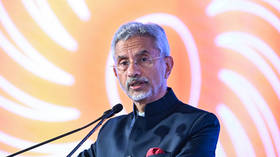UN Security Council should be more ‘contemporary’ – India
The days when a few nations “set the agenda and expected others to fall in line” are over, Foreign Minister S. Jaishankar has said
Indian External Affairs Minister Subrahmanyam Jaishankar urged the United Nations Security Council (UNSC) on Tuesday to become more “contemporary” while also advocating for an equitable and inclusive global order.
The minister made a strong pitch for the inclusion of India as a permanent member of the UNSC during his speech at the 78th session of the United Nations General Assembly in New York.
He cited India’s efforts to amplify the voices of the Global South, such as the addition of the African Union to the G-20 at this month’s summit hosted by New Delhi.
“We gave voice to an entire continent which has long been its due. This significant step in reform should inspire the United Nations, a much older organization, to also make the Security Council contemporary.”
“The international order is diverse and we must cater for divergences, if not differences. The days when a few nations set the agenda and expected others to fall in line are over,” Jaishankar said.
He emphasized India’s evolution from a prominent member of the non-aligned movement to that of “Vishwa Mitra” – or a friend of the world – and its commitment to foster cooperation with a diverse group of partners such as the Quad, BRICS, I2U2 and IMEC (the India-Middle East-Europe Economic Corridor).
Seeking a place at the global high table, Jaishankar pointed out the anomalies in the promotion of what is commonly called the rules-based order.
“From time to time, respect for the UN Charter is also involved. But for all the talk, it is still a few nations who shape the agenda and seek to define the norms. This can’t go on indefinitely nor will it go unchallenged. A fair, equitable, and democratic order will surely emerge once we all put our minds to it. And for a start, that means ensuring that rule-makers do not subjugate rule-takers.”
The minister highlighted India’s transformational role on the international stage, which resonates with Prime Minister Narendra Modi’s vision of “One Earth, One Family, One Future” and the “exceptional responsibility” with which New Delhi took up the rotational G-20 presidency.
“India sought to focus on the key concerns of the many, not just the narrow interests of a few,” Jaishankar said, while referring to “structural inequities and uneven development” between North and South, and a sharp polarization between East and West.
The minister drew attention to the ‘Summit of the Future’, which the UN will host next year. “This should serve as a serious opportunity to drive change, champion fairness and reform multilateralism, including the expansion of the Security Council memberships. We must address global challenges imbued with the conviction that we are one earth and one family, with one future,” he added.
On Monday, Jaishankar met with UN Secretary-General Antonio Guterres and the president of the 78th session of the General Assembly, Dennis Francis. In a readout of the meeting issued by the UN spokesperson’s office, Guterres expressed appreciation for India’s cooperation with the UN and its leadership of the G-20.
You can share this story on social media:








Comments are closed.